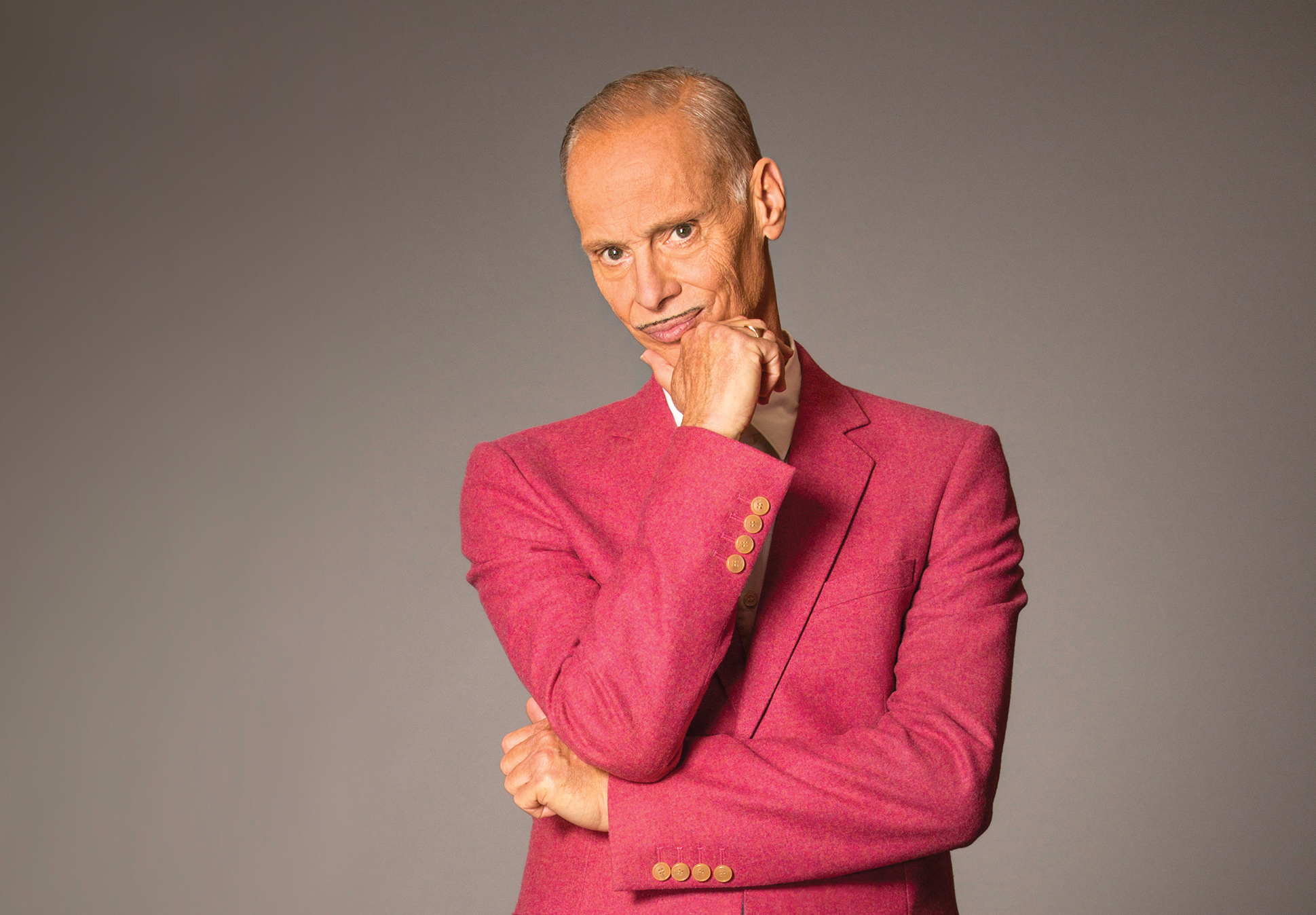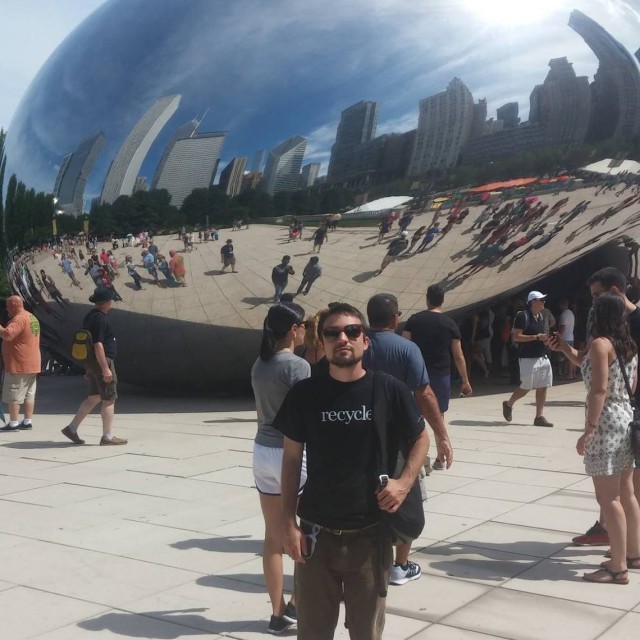 Photos by Greg Gorman
Photos by Greg Gorman
The evolution of John Waters from underground film anarchist and good taste-demolition expert to eccentric memoirist and elder statesman of American pop art has been a long and gradual one. And it’s more shocking than ever today. Pink Flamingos, his rough-hewn 1972 classic, remains a challenge to intestinal fortitude that holds its own with any of the internet shock videos younger generations dare each other to watch today. And in 2020, it’s also as likely to be glimpsed on Turner Classic Movies or amongst a stack of the Criterion DVDs as it is in a midnight screening. Whether you take it as a sign of society’s progress or as proof that we are truly living among the damned, one must ask oneself: Whither filth?
Filth, trash and anarchic humor are central to the Waters persona, but the secret to his longevity lies in the fact that shock alone has never been the final nesting doll. After a run of mainstream-friendly hits starting with his self-proclaimed “Trojan horse” Hairspray (1988), his eclectic, unmistakable style has found success across numerous artistic fields, from concept art (watch out for “serious” looking monochrome photography that suddenly squirts water on unsuspecting passersby, or a portrait of Justin Bieber re-envisioned as a plastic surgery addict) to literature. Over the past four decades, he’s also put out seven well-received books, in which nearly all of his obsessions, loves, hates, heroes, turn-offs and tall (yet true) tales are brought to life with rabid enthusiasm.
As Waters has continued to reveal his character over countless speaking tours, one-man shows and commencement speeches (!), the more likeable he gets, and the clearer it becomes that all of his works—even the sledgehammer-subtle affronts of his early days—are the product of careful study. Not the sort that demands rote memorization of the art-school canon; the kind that gleefully dynamites the hidebound aristocracy of taste in favor of taking the things you love seriously, and fearlessly diving into your own, uniquely warped sensibilities. Doing so has given him one of the more devoted cult followings in entertainment. It has also honed his talents long into his career; he has a near-supernatural gift for locating sites of aesthetic turbulence in any given situation and magnifying them for maximum hilarity.
This gift is gloriously displayed in This Filthy World, based on a live show and documentary film that first ran in 2006 and is now set to reach Sacramento next month on a new national tour, fully revamped for our current tasteless times. The special covers a lifetime of surreal experiences and questionable interests that have made John Waters a true American original, from off-putting art to shocking crimes and seedy celebrity scandals, from the life-giving force of B-movie energy to the local folks of Baltimore that inspired some of his more outrageous on-screen characters. And in our age of particularly virulent outrage, he manages to embody the nicer side of nasty.

This Filthy World is the topic of the day, but I have to say that one of my favorite pre-Christmas stocking stuffers is your top-10 favorite film-of-the-year list. Your reviews are always more exciting than the trailer.
Thank you. It always gets a lot of attention, because it’s the very first top 10 list that comes out—ArtForum publishes it on Dec. 1, and most lists come out on Jan. 1. So I get a lot of bang for my buck, pushing movies that mostly aren’t on anyone’s 10-best lists.
Whenever I doubt whether film still has the capacity to shock, you always manage to find the ones that do.
Well, I try to surprise the audience, and so I try to pick films that would surprise me. I didn’t think I was gonna really like Joker, but I really did, so I was happy to put that in there, too. And I’m happy to remember that Todd [Phillips], the director, started out making the GG Allin documentary, called Hated. So I love that he really clawed his way to the top and somehow got Joker through the Hollywood system.
What’s usually the moment in a film for you when you realize you’re watching something special?
Well, I can usually tell right away. If you’re watching a movie, and you don’t like it 40 minutes into it, you’re not gonna like it. And usually, if it’s in my 10-best list, it’s the kind I like better and better as it goes on. Or, I’m so troubled by it, that I don’t know if I hate it or like it, which would definitely be one that was on my 2019 list, The Golden Glove, the one about the serial killer. Oh God, that movie is really a shocker; I couldn’t tell how I felt about it. I decided it’s worth seeing, and it’s incredibly well done, but it’s very, very unpleasant to watch.
Has anything changed radically in the state of filth since you last did the show?
Well of course! With this president. You can’t really do a show called This Filthy World today without doing some filthy stuff about Trump, because he talks about people filthily, too, so I think it’s fair game. And I always say afterwards what a great country it is that I can say some of this stuff and not get the firing squad.
Has it gotten more or less crazy today as it was in the ‘60s and ‘70s when you were starting out?
I don’t think it has. I don’t get why there aren’t demonstrations every day! When I grew up, it seemed like even Nixon wasn’t this bad, and there were riots every day, there were bombings and carjackings, there was a lot of protests. Compared to that, I don’t see that much today. What happened to all the good kids who were walking out of school, how come they’re not? Why aren’t the bad kids walking out? The Women’s March is just one day a year—it should be everyday!
Do you think, for that earlier generation, it took growing up mostly in a cocoon of solid middle class sensibility and stability to really cause the political panic and urgency of what came in the next decade when things turned out different?
The ‘50s were a terrible time! People don’t remember that. Everybody had to be alike, everything was supposed to be like Father Knows Best … oh, it was horrible! It was probably the worst decade that I grew up in. Yes, we had good cars, and rock ‘n’ roll was invented, and a lot of good things happened, but it was all because of how stupefyingly square the world was. Yeah, it was a very different time. I don’t look back at it and think, “Oh God, I wish it was like that.” I think it was better in some ways, and worse in others.
I don’t think that kids aren’t having just as much fun today as I did when I was young, being hackers, or whatever it takes to be a juvenile delinquent today.
Being a filth icon, do you have people constantly sending or sharing with you the latest nasty things to come up from the internet or in culture?
Sometimes, but mostly my fans are smart, and they give me great presents. I know what you mean; there’s things like, you know, people have eaten shit in front of me, or taken out their Tampax and asked me to autograph it. But they’re all doing it in good humor. They all mean well, all of them. I’ve never really had anybody do anything that truly offended me. I mean, I think it was kind of funny.
Have you come across anything recently that threw you for a loop?
Well, I don’t really understand the plushy thing. You know, I went into a leather bar they have in Baltimore, and I’m still amazed that they have a leather bar left open, because young people don’t need to be tied up ‘cause they’re gay—they’re mostly just happy with it. And there were plushies there. Plushy S&M?! So I guess the plushy fetish I don’t get. I never liked stuffed animals anyway. Much less would I want to be one or fuck one. And adult babies, I’m not marching for them, either.
And there’s ecosexuals! I talk a lot about this in my show. Ecosexuals bury themselves naked and kiss the earth, lick plants while people dance around. To each their own. I guess with any of it, people have to eroticize whatever body type they end up with. Maybe that’s good.
How did you develop your sense of what is wrong, taste-wise?
I was raised very much to have good taste, what my parents thought was good taste. And the tyranny of good taste is what I rebelled against. But I thank them and acknowledge them in my new book, Mr. Know-It-All. I thank them for giving me the impression of good taste so I could rebel and make a career out of bad taste. But I think to appreciate bad taste, in the right way, you have to know what good taste is, and actually have good taste to appreciate it. Because “bad” bad taste, well, that’s the Trump White House. There’s nothing funny about how they decorated, there’s nothing campy; it’s just bad Jeff Koons.
In some sense, do we need a bland, vanilla, middle class sensibility as a counterpoint in order to truly shock or get creative rebelling against it?
No, definitely not. I think everybody can appreciate taboos, everybody can appreciate making fun of the rules. And every organization has rules. Liberals have more rules now than even conservatives. So, to me, I think everybody understands making fun of their own rules, and that’s how you keep a sense of humor, if you can make fun of your own rules. If you can’t, then I think you somehow become the enemy.
In that sense, with all the new rules and the way things have shifted, do you think it would be a lot tougher for a renegade beginner in art such as you were to enter into the fray now?
No, I think it could still happen. I think I made fun of myself first; I criticized everything I did first. I called my first movie Mondo Trasho! I think I make fun of myself, therefore I can make fun of the rules with, like, the gay world, or political correctness, even though I think I am technically politically correct. I do make fun of the fact that it seems to be just for rich people. You know, all this obsession about political correctness. A lot of it I agree with, but the radical ends of political correctness is why Trump is gonna win again.
Even your most extreme work doesn’t seem too mean-spirited. Is lightheartedness the key to being as filthy as you want?
Well, I don’t think I’m mean; I guess I’m mean about Trump. But most of the things I criticize are things that I like! I make fun of the art world because I like the elitism of the art world. I make fun of obscure art movies because I love feel-bad European films. I’m making fun of things I love, which is a very different turn than making fun of things you hate.
What other topics can we expect in the new edition of This Filthy World?
Well, I certainly talk about politics. I talk about humor, I talk about fashion, I talk about death, I talk about life. I think it’s a lot of equal-opportunity topics that I go over throughout the show. And it’s not just what’s in the book, it’s always changing. The skeleton of it may be the same, a little bit, and I do go through the movies, but it’s not so much anecdotes about making them anymore, it’s what’s happened to them—the subjects in them and what’s changed—that somehow, these movies are respectable now. Which is amazing to me … This week on Turner Classic Movies, they’re showing Multiple Maniacs! How could that be possible?
John Waters’ This Filthy World Tour comes to the Crest Theatre (1013 K St., Sacramento) on Friday, Feb. 28 at 6:30 p.m. Tickets start at $35 and can be purchased in advance through Crestsacramento.com.
**This piece first appeared in print on pages 16 – 17 of issue #310 (Jan. 29 – Feb. 12, 2020)**


Comments